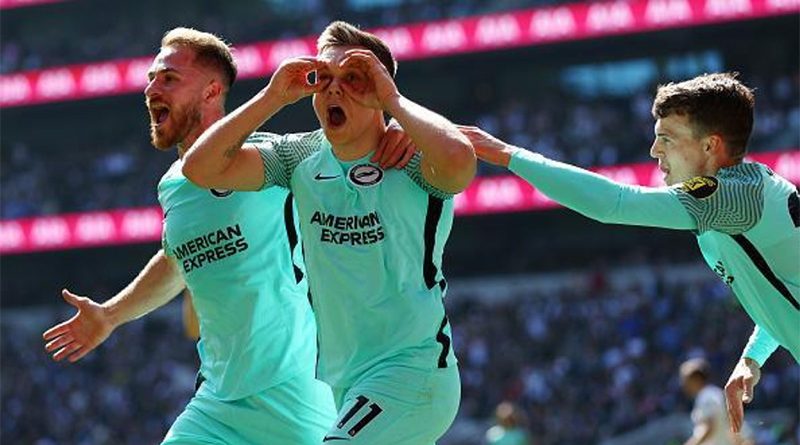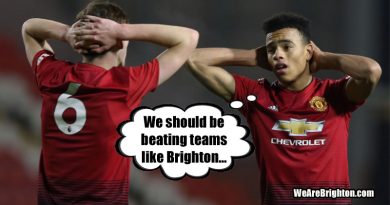60 minute football matches? Not for Brighton, thank you
The more American owners in the Premier League, the more they will try and change it. Todd Boehly and his suggestion of an All Star Game is only the start. We can expect a lot more nonsense like that to be floated over the coming months, including the idea of 60 minute football matches being revived.
When Florentio Perez and the so-called European Elite launched their failed attempt at a Super League back in April 2021, shortened games were high on the agenda.
The Super League considering matches over 60 minutes rather than 90 almost went unnoticed. Hardly a surprise, seeing as the concept was overshadowed by greed, the lack of relegation and the elevated sense of self-importance shown by Chelsea, Manchester United, Manchester City, Liverpool, Arsenal, Spurs and their counterparts on the continent.
Perez claimed: “Football has to change and adapt. We have to analyse why young people, 16-to-24-year olds, 40 per cent of them aren’t interested in football.”
“Why? Because there are a lot of low-quality games, and they have other entertainment platforms. It’s a reality. They say the games are too long. We have to change something if we want football to stay alive.”
A European Super League would have been the ultimate Americanisation of the Beautiful Game in Europe. The closed shop with no promotion or relegation, the so-called glitz and glamour, the idea of clubs playing matches around the world.
All of it would be taking football and turning it into the NFL, the NBA or the NHL. The European Super League may have been killed off (for now) by the negative reaction of fans, but that does not mean that English football is safe from future attempts to radically alter the game.
More Americans now own Premier League clubs than ever before. You have Boehly at Chelsea, Stan Kroenke at Arsenal, Shahid Khan at Fulham, Fenway Sports Group at Liverpool, the Glazers at United, the new Las Vegas-based consortium about to buy Plucky Little Bournemouth.
Boehly has been here five minutes and between signing Brighton players and buying the Albion’s entire coaching staff, he has already found time to say football needs to learn from America.
Those clubs backed with US dollars would jump at the chance of changing English football. All Star games, an 18 team Premier League, no relegation to the Championship and even less consideration for supporters than there is now.
Get ready to stay up until 3am on a Sunday morning to watch Brighton v Everton because it is the big 7:45pm kick off live from Los Angeles. And it will be a 60 minute game, as all football matches are under our new American lords and masters.
Based on the 2021-22 Premier League season, Brighton have particular reason to fear 60 minute football matches. Boylesports looked at timestamped data from all 380 matches played in the previous campaign, including goals, red and yellow cards and penalties.
They then visualised how the performance of teams and players was impacted across 90 minute matches, and what would happen if games were reduced to one hour
It will come as no surprise to Seagulls supporters that the Albion would have been the big losers from 60 minute football matches, surrendering enough points to drop from that record-breaking ninth place to finish 17th in the table.
Graham Potter’s side would have just about survived relegation above an unchanged bottom three of Norwich City, Watford and Burnley.
If Premier League matches had been 30 minutes shorter in 2021-22, would Potter be Chelsea manager right now? Answers on a postcard.
The data serves as a reminder of the importance of all those late goals Brighton scored. Last minute winners earned victories at Brentford and Spurs, both from Leandro Trossard.
Neal Maupay struck equalisers away at Crystal Palace, West Ham United and Southampton. Danny Welbeck levelled in the final 10 minutes at Chelsea and Leicester City. A Joachim Andersen own goal rescued a point with 180 seconds of the 90 remaining at home to Palace.
Even games like Burnley away on the opening day or West Ham at home on the final day of the season would have turned out differently if played over an hour.
At Turf Moor, Maupay and Alexis Mac Allister struck in the final 15 minutes. Against the not-so-happy-Hammers, Pascal Gross and Welbeck scored in the last 10 at the Amex to turn what would otherwise have been a 1-1 draw into a 3-1 win.
No team in the Premier League would have experienced such a big change in position as Brighton’s eight place drop under 60 minute matches.

That underlines the character Potter had in his squad, as well as his tactical acumen in finding ways through opposition teams no matter how late in a game it was.
Wolves would have been the other big losers, falling six places to 16th. Manchester City, Liverpool and Chelsea remained the top three but Spurs would have leapfrogged Arsenal to claim the final Champions League spot.
As well as transforming Brighton from top 10 to relegation candidates, the study also shows that those final 30 minutes which Perez reckoned football could do without is where the majority of the action in the Premier League occurs.
From 76 to 90 minutes was when the highest percentage of events occurred, at 28 percent. This includes the most goals (17 percent of goals scored) and the most subs (39 percent).
The 15 minutes between 60 and 75 is not bad either, containing 26 percent of the action. This includes the most yellow cards (33 percent), a high percentage of own goals (23 percent), the most penalties (19 percent) and the most penalty misses (21 percent).
So whilst 60 minute football matches would be bad news for Brighton, they would also have a detrimental impact on the overall entertainment of the Premier League.
Another reason to resist American overlords like Boehly and whatever it is they have planned for English football. Our game is fine without your interventions, thank you very much.
You can read the full Boylesports Study on 60 minute football matches here.




